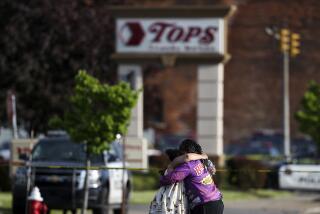Ralph Wilson dies at 95; founder of Buffalo Bills
- Share via
Ralph Wilson, who founded the Buffalo Bills with a $25,000 investment in 1959 and turned the team into western New York’s defining institution, died Tuesday after years of failing health. He was 95.
Wilson was surrounded by his family when he died at his home in Grosse Pointe, Mich. NFL Commissioner Roger Goodell informed team owners of the news at the league’s annual meetings in Orlando, Fla.
Goodell called Wilson “a driving force in developing pro football into America’s most popular sport” and “a trusted advisor to his fellow league owners and the commissioner.”
A co-founder of the American Football League, which began play in 1960, Wilson took the first steps toward the eventual AFL-NFL merger by initiating talks with Carroll Rosenbloom, who at the time owned the Baltimore Colts. Later, Wilson would become emblematic of small-market owners who stayed afloat — and refused to move their franchises — as the NFL enjoyed an explosion in popularity. The Bills were valued at $870 million in 2013 by Forbes magazine.
“When he had opportunities to move the team to much greener pastures, he said many times, ‘The team will not leave Buffalo in my lifetime,’ ” said Bill Polian, former Bills president. “He was as good as his word.”
In fact, the Bills play in Ralph Wilson Stadium in Orchard Park, N.Y., and are the only team to play in New York state, as both the New York Giants and Jets play their games in East Rutherford, N.J.
“He went in when Buffalo was thriving and persevered when Buffalo started declining a little bit because most of the businesses moved out,” Jets owner Woody Johnson said. “He was very loyal to Buffalo and to that part of the state.”
Although Wilson’s team never won a Super Bowl, the Bills had an unprecedented run at the start of the 1990s, winning four consecutive AFC championships from the 1990 through ’93 seasons.
Wilson, who is survived by his wife, Mary, and daughters Christy and Edith, said the Bills would not remain in his family after he died, and it has long been speculated that a new owner might relocate the franchise, possibly to Los Angeles or Toronto.
In 2012, the Bills signed a 10-year lease extension in exchange for stadium upgrades, making relocation a nettlesome and expensive proposition. If the team were to leave before 2020, it would have to pay $400 million in liquidated damages to the county and state. After the seventh year of the agreement, however, the Bills would have a one-time option to buy out the remaining three years of the deal for $28 million.
Wilson’s death is sure to trigger speculation that the team might look for a way out of Buffalo.
Born on Oct. 17, 1918, in Columbus, Ohio, Ralph Cookerly Wilson Jr. grew up in Detroit, attended the University of Virginia and the University of Michigan Law School and eventually took over his father’s thriving insurance business. He was in the Navy, fought in World War II and more than once had a front-row seat to history.
“He was a commander on a mine sweeper, which is a wooden boat waiting to be blown up,” said Joe Horrigan, vice president of the Pro Football Hall of Fame, which enshrined Wilson in 2009. “He was one of the early responders after Pearl Harbor was attacked. He was at Hiroshima after the bomb. He was on the Missouri when the Japanese surrender took place. And he would never, ever talk about it.
“The way he helped so many former players and friends in need. He bankrolled the Oakland Raiders in the early years of the AFL to keep them afloat so the league would stay afloat. He was a man who did what he thought was right, always, and never took bows.”
Wilson was a member of the “Foolish Club,” the group of original AFL owners, among them the now-deceased owners of the teams that became the Kansas City Chiefs (Lamar Hunt), Tennessee Titans (Bud Adams,) Jets (Harry Wismer), Denver Broncos (Bob Howsam), New England Patriots (Billy Sullivan) and Oakland Raiders (Wayne Valley). The only surviving member of the Foolish Club is Barron Hilton, who founded the team that started playing in Los Angeles and became the San Diego Chargers.
“Hey, we were rolling the dice,” Wilson told the Kansas City Star in 2009 of the start of the AFL. “I’m a guy who takes a risk. The people in my hometown, Detroit, laughed at me. They asked, ‘Are you goofy, going into some honky-tonk league?’
“I said, ‘Well, maybe so. We’ll see.’ ”
More to Read
Start your day right
Sign up for Essential California for the L.A. Times biggest news, features and recommendations in your inbox six days a week.
You may occasionally receive promotional content from the Los Angeles Times.







